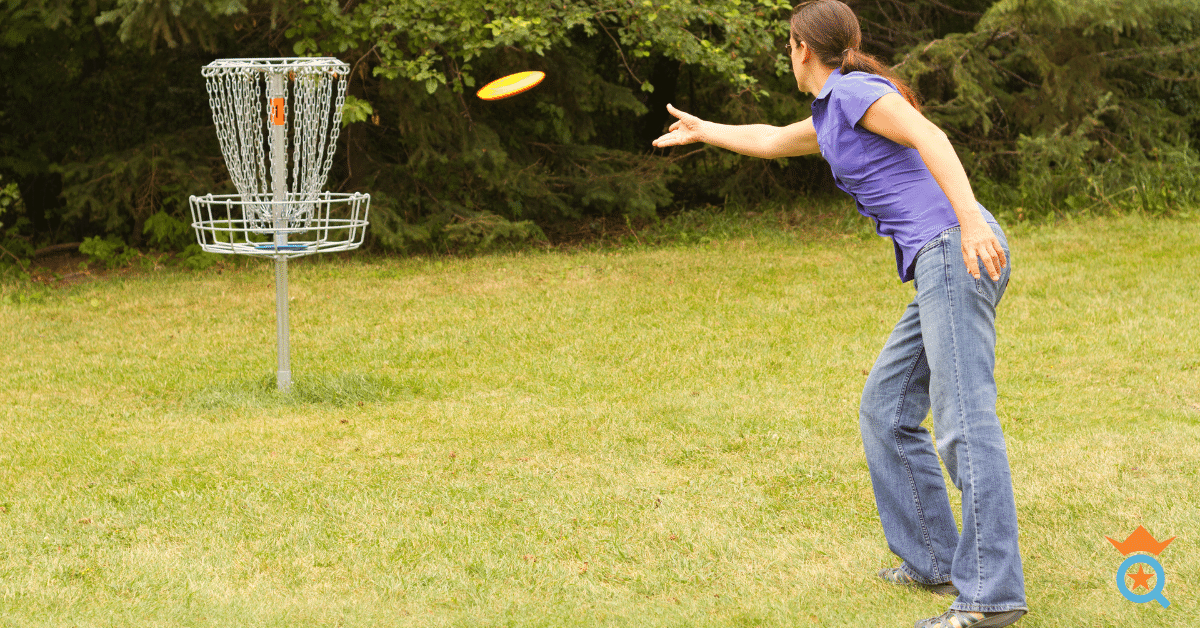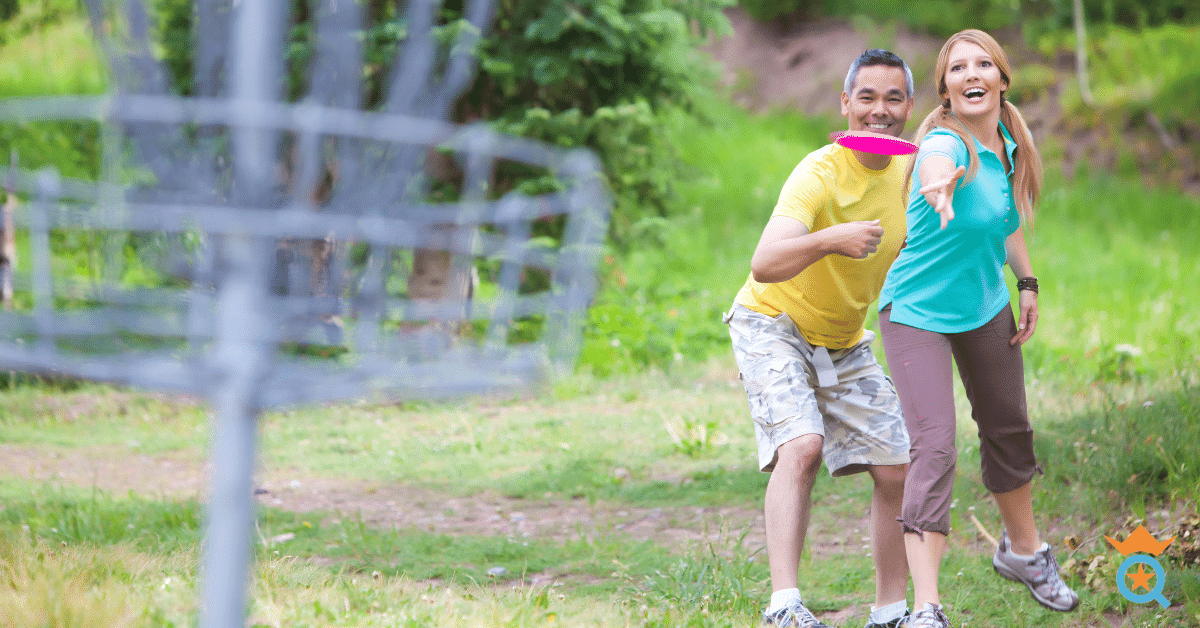Disc golf is a rapidly growing sport that combines the classic appeal of golf with the excitement of flying discs or Frisbees®. As a unique and accessible activity for players of all ages, skill levels, and backgrounds, disc golf is capturing the hearts of enthusiasts worldwide.
This article aims to provide an in-depth understanding of disc golf, its diverse community of players, and the distinct aspects that make this sport both challenging and enjoyable.
Whether you are a seasoned disc golfer or someone intrigued by this fascinating game, this comprehensive guide will help you gain a deeper appreciation for the sport and its thriving community.

What is Disc Golf?
Disc golf is a sport that shares similarities with traditional golf, but instead of using a ball and clubs, players throw a flying disc or Frisbee®. The objective of the game is to complete each hole in the fewest number of throws, akin to achieving the lowest stroke count in golf.
To play disc golf, a player begins at the tee area, from where they throw the disc towards a designated target, which serves as the "hole." The most common type of target in disc golf is an elevated metal basket. After the initial throw, players continue to make consecutive throws from the spot where their disc landed until they successfully land their disc in the target basket, thereby completing the hole.
Much like traditional golf, disc golf courses feature fairways that players must navigate, often with trees, shrubs, and varying terrain presenting obstacles along the way. These challenges can lead to the same mix of joys and frustrations experienced in golf, such as the thrill of sinking a long putt or the disappointment of hitting a tree mid-fairway.
While disc golf parallels traditional golf in many ways, including rules, obstacles, and the basic structure of the game, it also boasts its unique characteristics, such as generally lower costs to play and the use of specialized flying discs. As a result, disc golf offers a distinctive and enjoyable alternative to those seeking a new spin on the classic game of golf.

Who Plays Disc Golf?
Disc golf is enjoyed by a diverse range of people, making it a truly inclusive sport. Some key aspects of its wide demographic appeal include:
- Age: Players of all ages can participate in disc golf, from young children to senior citizens, making it an appealing activity for families and individuals alike.
- Gender identity: The sport welcomes players of any gender identity, creating an inclusive environment for everyone to enjoy the game.
- Economic status: Disc golf is often more affordable than traditional golf, with many public parks offering free courses. This accessibility makes it an attractive option for people from all economic backgrounds.
The versatility and accessibility of disc golf contribute to its popularity as a lifetime fitness activity. With its easy-to-learn gameplay and adaptable pace, disc golf accommodates players of all skill levels, allowing them to gradually improve and challenge themselves as they progress.
This makes the sport an excellent choice for those seeking a fun and engaging way to stay active throughout their lives.

What is the Professional Disc Golf Association (PDGA)?
The Professional Disc Golf Association (PDGA) is a membership-based organization that represents the sport of disc golf on a global scale. With over 200,000 lifetime members hailing from 54 countries, the PDGA serves as the principal authority for the sport and fosters its growth worldwide.
As the sport's governing body, the PDGA plays a crucial role in sanctioning competitive events catering to players of all skill levels. These events range from local tournaments for amateur players to elite-level competitions featuring top professional disc golfers.
One of the PDGA's primary goals is to promote the expansion of disc golf by increasing the number of courses available to players. As a testament to the sport's growing popularity, there are currently more than 9,800 disc golf courses around the world, with new courses being installed regularly.
By providing guidelines and resources for course design and installation, the PDGA continues to support the growth and development of the sport for enthusiasts everywhere.
Where Can I Play Disc Golf?
City Parks
Many city parks offer disc golf courses that are free to play, making them an excellent starting point for newcomers to the sport. These courses are typically designed to accommodate players of all skill levels and provide a convenient and accessible option for residents.
Converted Golf Courses
As disc golf continues to gain popularity, some traditional golf courses are being converted to accommodate both golf and disc golf. These hybrid courses often offer a unique experience, blending the established landscape and challenges of a golf course with the distinct gameplay of disc golf.
Private Pay-to-Play Venues
Private pay-to-play venues are also becoming more common, providing players with a dedicated and well-maintained environment for disc golf. These venues often include additional amenities, such as pro shops, practice areas, and on-site instruction.
Ideal disc golf course locations combine a mix of wooded and open terrains, offering players a variety of challenges and topographical changes. A well-designed course should take advantage of natural features like elevation changes, water hazards, and vegetation to create a diverse and engaging experience for players.
As the sport of disc golf continues to grow in popularity, the demand for new courses is ever-increasing. The PDGA plays a crucial role in this expansion by offering resources and guidance for the design and installation of new courses.
By supporting the development of new courses and promoting best practices in course design, the PDGA ensures that the sport remains accessible and enjoyable for players across the globe.

Is Disc Golf Harder Than Golf?
Comparing the difficulty of disc golf and traditional golf is subjective, as the perceived difficulty can vary depending on an individual's skills, experience, and personal preferences.
However, there are some general points of comparison between the two sports that can provide insight into their respective challenges.
Skill Required
Both disc golf and traditional golf require the development of specific skills and techniques to excel. In traditional golf, players must learn various club swings and understand how to adapt to different course conditions, while disc golfers need to master different throwing techniques, such as backhand, forehand, and overhead throws. Both sports demand precision, control, and a solid understanding of the game's fundamentals.
Unique Challenges
Disc golf and traditional golf each present their unique challenges. Traditional golf courses can be significantly longer and may feature more complex hazards, such as sand bunkers and water features. Disc golf courses, on the other hand, often incorporate tighter fairways and obstacles like trees, bushes, and elevation changes that require players to navigate with precision and finesse.
Accessibility
In general, disc golf is considered more accessible to beginners due to its lower cost of entry and simpler equipment requirements. A new player can start with just one disc, while traditional golf requires a set of clubs and other accessories. Additionally, many disc golf courses are free to play, making it easier for newcomers to try the sport without a significant financial investment.
Ultimately, the perceived difficulty of disc golf versus traditional golf may vary from player to player. Both sports offer unique challenges and rewards, and individuals may find one sport more difficult or enjoyable based on their personal preferences, skills, and experiences.

What are the 3 Essential Rules of Disc Golf?
While there are numerous rules governing disc golf play, the following three essential rules are crucial for all players to understand and follow:
- Teeing Off: Each hole begins with a tee-off from the designated tee area. Players must throw their discs from within the tee area, ensuring that at least one supporting point (typically a foot) is in contact with the tee pad or within the tee box boundaries. Stepping over or outside the tee area before releasing the disc is considered a foot fault and may result in a penalty.
- Lie and Stance: After the initial throw, players must make each consecutive throw from the spot where their disc came to rest, known as the "lie." A mini marker disc can be used to mark the lie, or the thrown disc itself can serve as a marker. When throwing, a player must have one supporting point (usually a foot) in contact with the lie and should not have any supporting points touching the ground closer to the target. Stepping on or over the lie before releasing the disc is also considered a foot fault and may result in a penalty.
- Holing Out: To complete a hole, a player's disc must come to rest within the chains or the basket of the target. If the disc merely rests on top of the basket or is hanging outside of the chains, it is not considered "holed out." Once the disc is successfully holed out, the player records their score for that hole, which is the total number of throws made, including any penalty strokes incurred.
By understanding and adhering to these three essential rules, disc golfers can ensure fair play and maintain the integrity of the game while enjoying the sport to its fullest.

What is the Difference Between Frisbee Golf and Disc Golf?
Frisbee golf and disc golf refer to the same sport, with "disc golf" being the more widely accepted and used term. The main reason for the difference in terminology is that "Frisbee" is a registered trademark of the Wham-O toy company, while "disc" is a more generic term that encompasses all flying discs used in the sport, regardless of brand.
There are no significant differences between Frisbee golf and disc golf in terms of gameplay, rules, or equipment. Both terms describe the sport that involves throwing a flying disc from a tee area towards a target, usually an elevated metal basket, to complete each hole in the fewest throws possible.
While "Frisbee golf" might still be used colloquially by some players or in casual conversation, "disc golf" is the preferred term within the official disc golf community, including the Professional Disc Golf Association (PDGA). Using "disc golf" helps to avoid potential trademark issues and ensures a broader understanding of the sport.

What is the Golden Rule of Disc Golf?
The "golden rule" of disc golf is not an official rule in the sport's regulations, but rather an unwritten guideline that emphasizes sportsmanship, respect, and responsibility within the disc golf community. The golden rule can be summarized as follows: Treat other players, the course, and the environment with the same respect and consideration you would like to receive from others.
This principle encourages disc golfers to:
- Show courtesy and respect to fellow players by not distracting them during their throws, waiting patiently for your turn, and maintaining a positive attitude.
- Take care of the disc golf course by not littering, respecting designated paths and out-of-bounds areas, and refraining from damaging the course or its surroundings.
- Respect the environment by practicing "leave no trace" principles, such as packing out all trash, minimizing your impact on the natural surroundings, and avoiding harm to wildlife and vegetation.
By adhering to the golden rule of disc golf, players contribute to a positive atmosphere and sense of community within the sport, fostering an enjoyable experience for everyone involved.
This unwritten rule helps to maintain the integrity of the game, promote sportsmanship, and preserve the disc golf courses for future generations to enjoy.

Disc Golf World Rankings, Pro Tour, and Top Professionals
Disc Golf World Rankings
The disc golf world rankings are a system used to rank professional disc golfers based on their performance in various events and tournaments. The rankings, maintained by the Professional Disc Golf Association (PDGA), serve as a way to gauge the relative skill level of players and acknowledge their achievements in the sport.
The world rankings are typically updated throughout the year as players participate in PDGA-sanctioned events. Points are earned based on factors such as finishing position, field strength, and the tier of the event. The accumulation of points over time determines a player's position in the world rankings.
Disc Golf Pro Tour
The Disc Golf Pro Tour (DGPT) is a series of premier disc golf tournaments held throughout the year, featuring the world's top professional disc golfers. The DGPT aims to showcase the highest level of competition in the sport, promote its growth, and provide players with a platform to compete for prestigious titles and significant prize money.
The DGPT includes various events across the United States, culminating in the Tour Championship at the end of the season. The tour is known for its challenging courses, high-quality media coverage, and strong spectator engagement.
Top Professionals
The sport of disc golf has seen the rise of numerous talented professionals who have made their mark on the game. While it's impossible to list every notable player, some of the top professionals in the sport include:
- Paul McBeth: A multiple-time world champion, Paul McBeth is considered one of the best disc golfers of all time. Known for his exceptional skill, consistency, and competitiveness, McBeth has secured numerous major titles and holds a prominent position in the world rankings.
- Ricky Wysocki: Another dominant player in the sport, Ricky Wysocki has claimed multiple world championships and is known for his powerful throws and exceptional putting skills. Wysocki's determination and passion for the game have earned him a strong following within the disc golf community.
- Paige Pierce: Widely regarded as one of the top female disc golfers, Paige Pierce has numerous world championships under her belt. Pierce is known for her powerful drives, well-rounded skill set, and fierce competitiveness on the course.
These top professionals, along with many others, have helped to shape the sport of disc golf and inspire players worldwide to pursue excellence in their game.

Disc Golf Equipment: Discs, Gear, and Course Design
Types of Disc Golf Discs and Their Uses
There are several types of disc golf discs, each with specific flight characteristics and intended uses.
The main categories are:
- Putters: These discs have a rounded edge and are designed for shorter throws and precision shots, particularly for putting into the basket. They have the slowest flight speed and offer the most control.
- Mid-range discs: Mid-range discs are versatile and used for a variety of shots, including controlled drives, approach shots, and shorter-distance throws. They have a balanced combination of speed, glide, and stability.
- Fairway drivers: Fairway drivers are designed for longer drives and provide more speed and distance than mid-range discs while maintaining control. They are often used for tee shots on shorter holes or for long approach shots.
- Distance drivers: These discs have the highest speed and are designed for maximum distance. They are ideal for players with strong arm speed and are commonly used for tee shots on longer holes. Distance drivers are typically more challenging to control for beginners.
Essential Disc Golf Equipment
In addition to discs, disc golfers require other essential equipment for successful play:
- Dynamic discs: This term often refers to discs produced by the brand Dynamic Discs, but it can also be a general reference to high-quality, professional-grade discs from various manufacturers.
- Mini marker discs: These small discs are used to mark a player's lie on the course, indicating where the next throw should be made from. They are an important aspect of following the rules and maintaining fair play.
Disc Reviews and Choosing the Right Disc
Disc reviews can be a valuable resource for players looking to find the best disc for their skill level and throwing style. Reviews often cover aspects such as flight characteristics, stability, and durability. To choose the right disc, players should consider their skill level, arm speed, and intended use for the disc (driving, mid-range, or putting).
General Location and Layout of a Disc Golf Course
A disc golf course typically consists of a series of holes, each with a tee area, fairway, and target (usually an elevated metal basket). The course layout should include a variety of terrain, such as wooded and open areas, elevation changes, and obstacles like trees or rocky hills. This variety challenges players and tests different aspects of their skillset.
Official Rules and Course Design Considerations
When designing a disc golf course, it's crucial to follow the official rules and guidelines set forth by the PDGA. This includes ensuring appropriate distances between holes, providing safe and marked tee areas and fairways, and installing targets according to specifications. Course design should prioritize safety, challenge, and accessibility for players of all skill levels.
Additionally, incorporating the natural environment and minimizing the impact on the surrounding ecosystem is an essential consideration for a successful disc golf course.

Final Words
Disc golf is a sport that is both accessible and rewarding for people of all ages, gender identities, and skill levels. Its low barrier to entry and flexible scheduling make it an appealing option for individuals and families alike. With its combination of physical and mental challenges, disc golf provides an enjoyable and engaging way to stay active and connect with nature.
Whether you're a beginner looking to pick up a new hobby or an experienced player seeking to improve your skills, disc golf offers a wealth of opportunities for personal growth and enjoyment. So grab a disc, find a local course, and discover the fun and excitement of disc golf for yourself!



